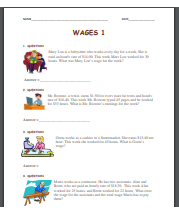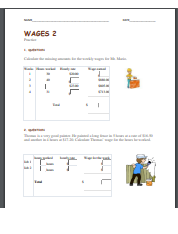When we work we earn a salary or a wage. A salary is associated with money earned at the end of a month. A wage is based with the compensation calculated according to the amount of hours worked multiplied to the hourly rate of pay. Generally, an employee would be paid at the end of a work week that follows hours worked.
Examples:

Alan works in a factory. He earns $620 after a 40 hour work week. What is his hourly wage?
Alan’s hourly wage = $620 ÷ 40 hours = $15.50 per hour
Mark, a factory worker, works 40 hours per work week. If his hourly rate of pay is $15, What is his weekly wage? If he works for 30 hours in the next week, what is his weekly wage?
- Mark’s weekly wage would be 40 hrs x $15.00 or $600.
- If Mark works for 30 hours, the weekly wage would be 30 hrs x $15.00 or $450.
Weekly wage can also be calculate by dividing yearly earning by the amount of weeks in the year. (There are 52 weeks in the year).
Exercises
What is the weekly wage for a factory worker who earns $35,360 yearly?
The weekly wage will be the yearly wage ÷ the amount of weeks in the year.
35360 ÷ 52 = $680 per week
Factory worker A earns $480 in a week for 20 hours. Factory worker B earns $720 in a week for 40 hours. Who earns more?
Factory worker A hourly rate = 480÷20 = $24 per hour
Factory worker B’s hourly rate = 720÷40 = $18 per hour
Answer = Factory worker A earns more.
Worksheets
Click on the links below to download the PDF worksheets.
Click here for more worksheets.





